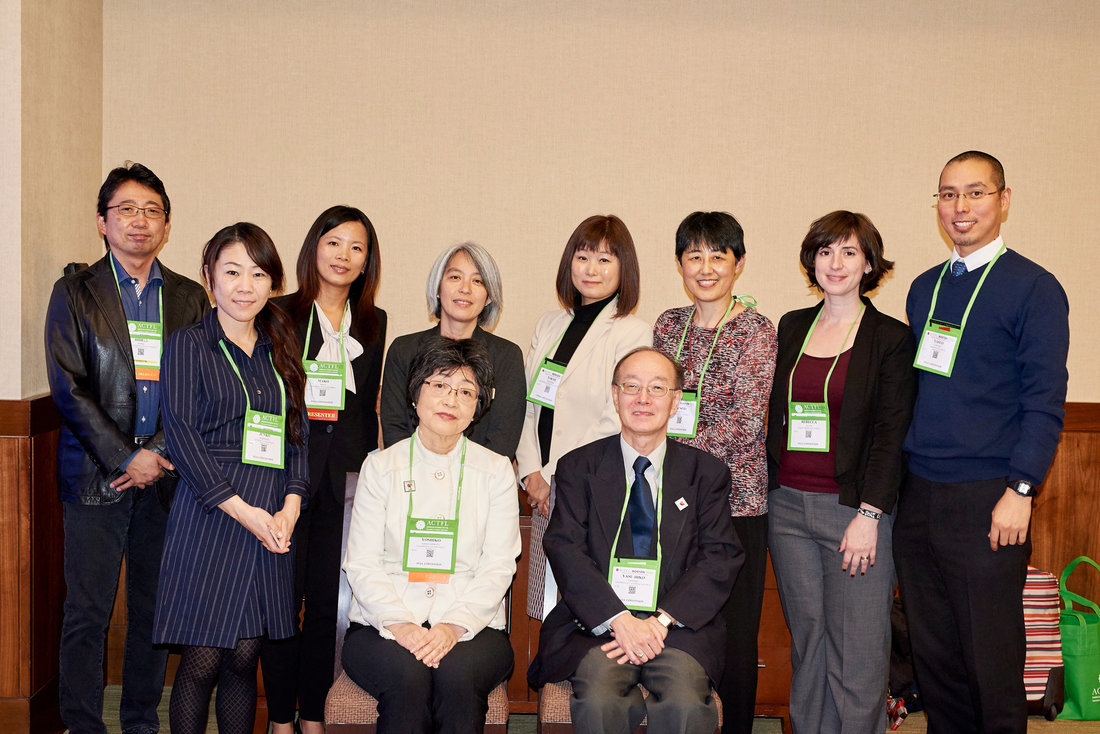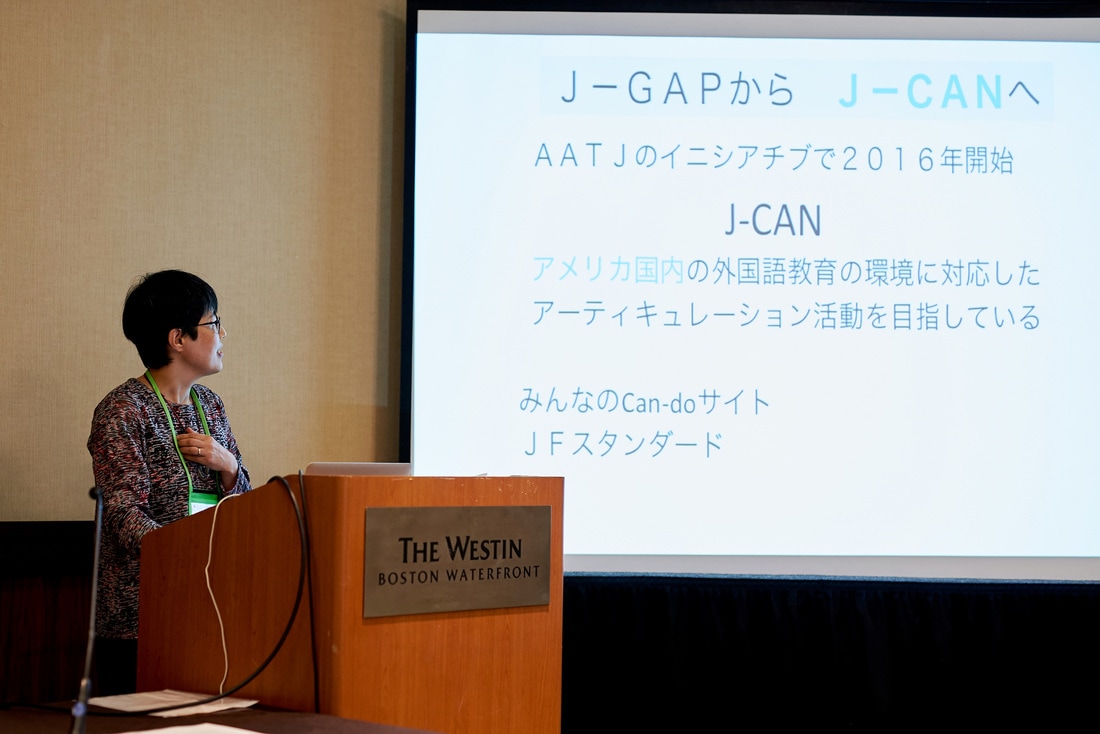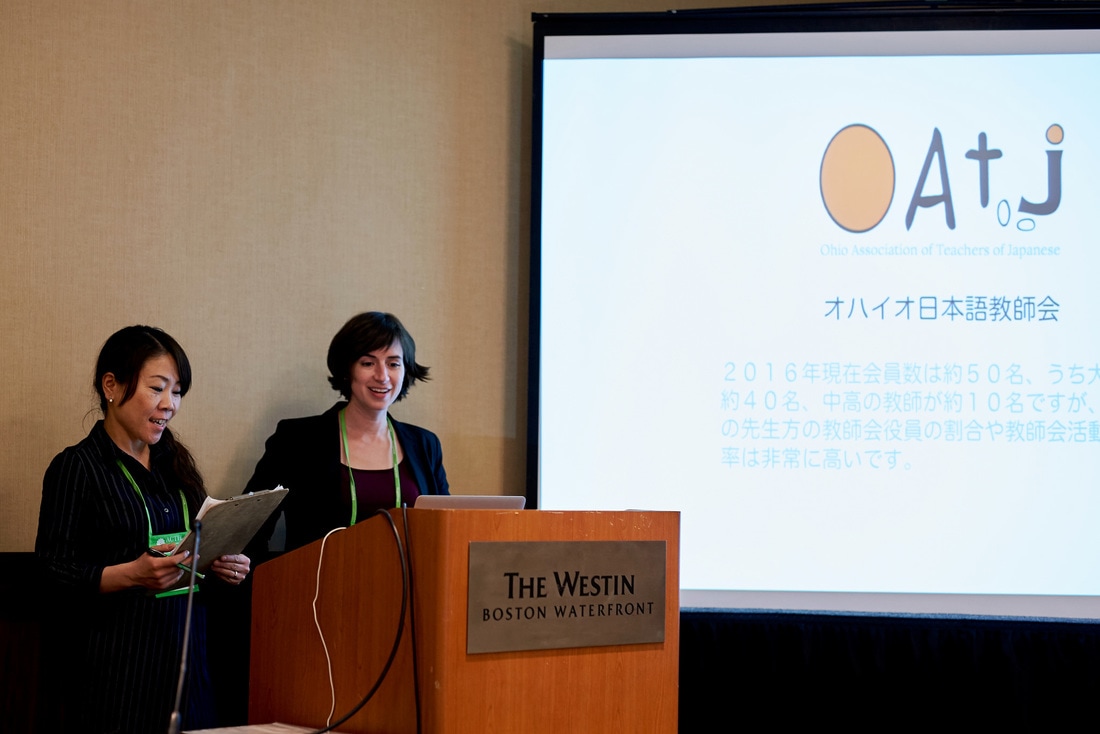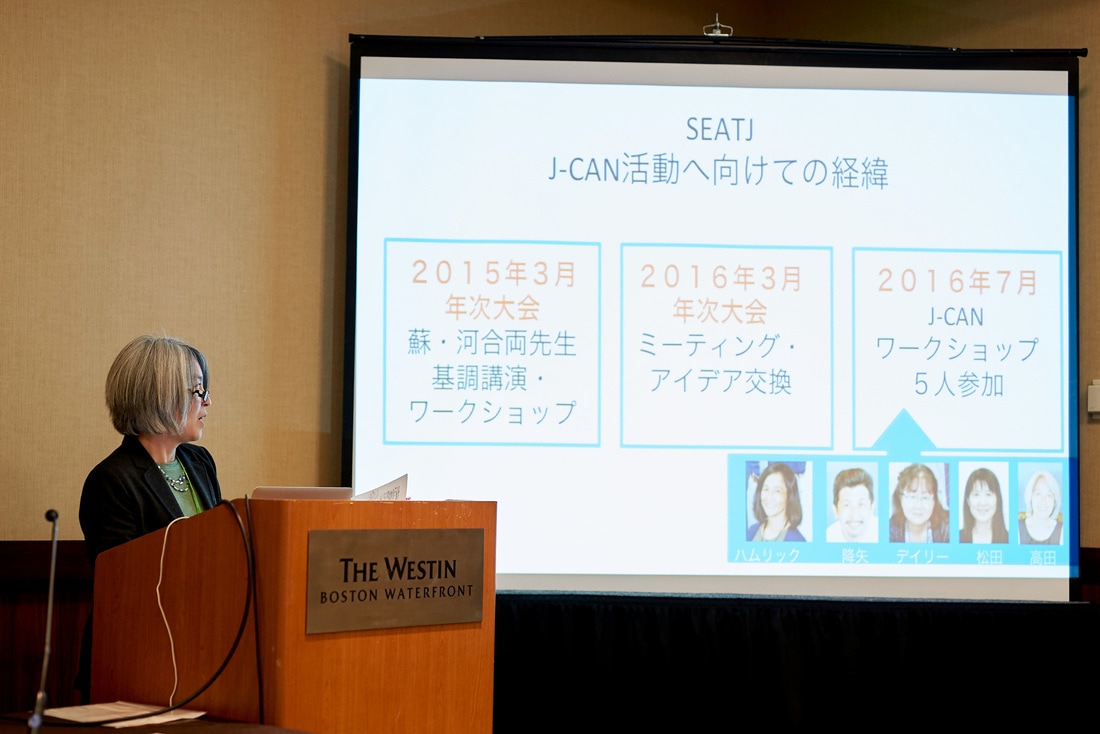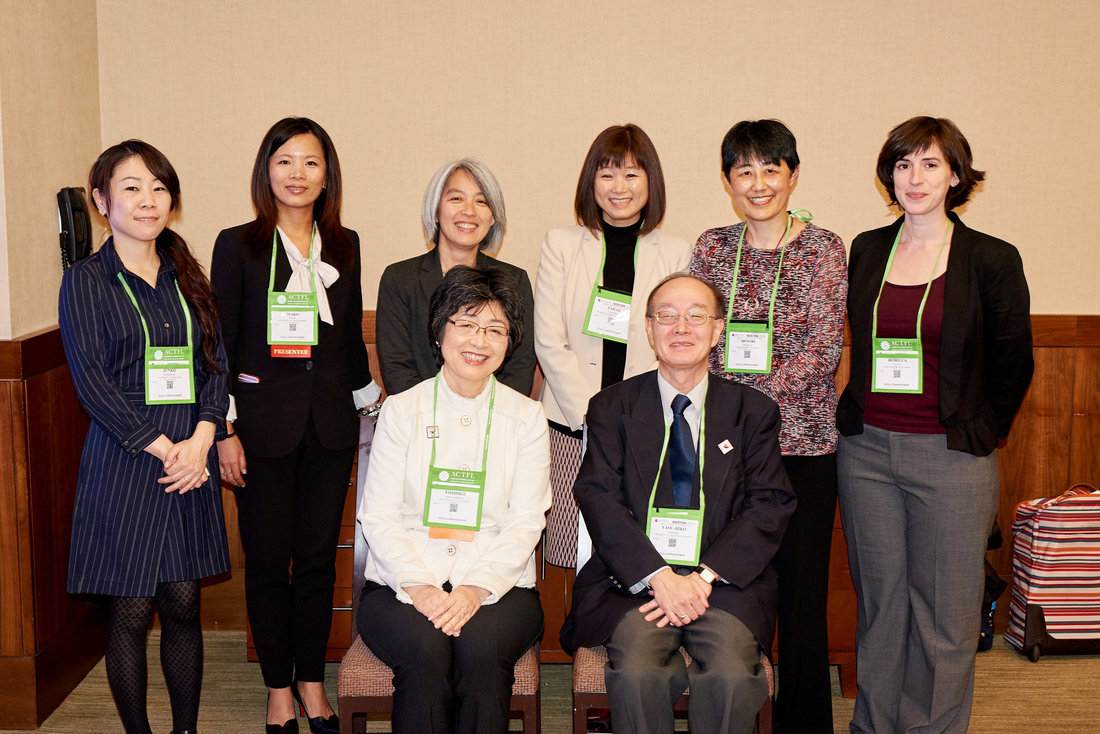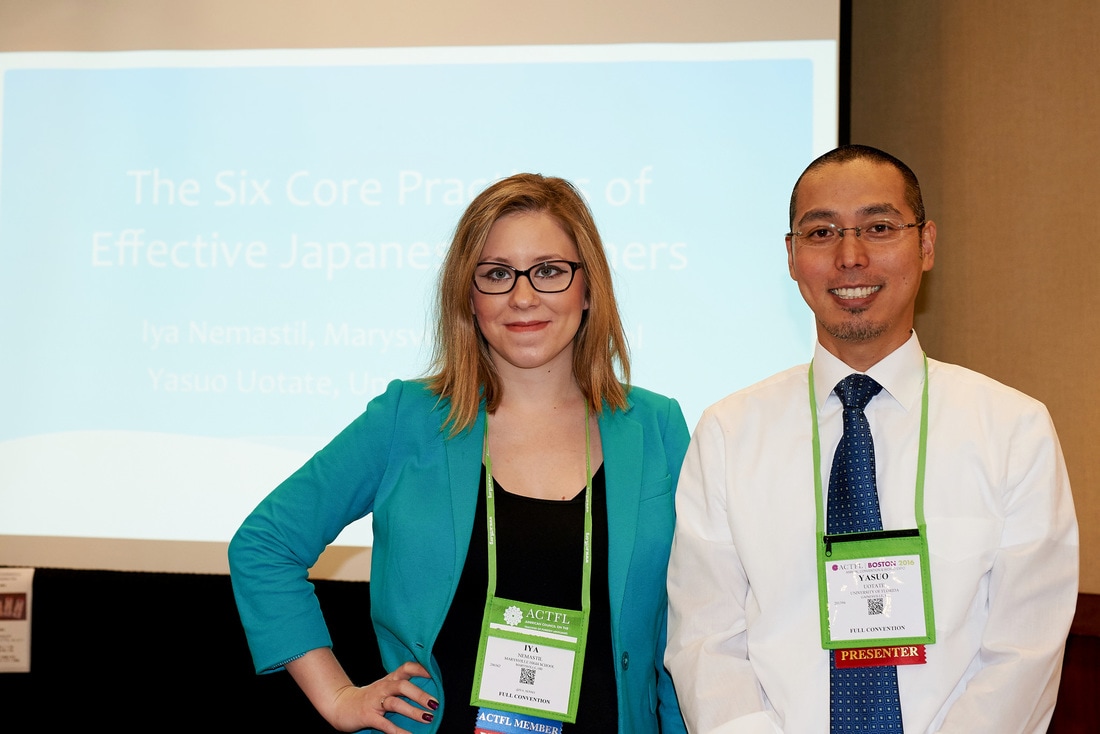J-CANメンバーによるACTFL学会参加と発表
ACTFL 2016
American Council on the Teaching of Foreign Languages (ACTFL)
2016 Annual Convention and World Languages Expo
November 18-20, 2016
Boston Convention and Exhibition Center, Boston, MA
American Council on the Teaching of Foreign Languages (ACTFL)
2016 Annual Convention and World Languages Expo
November 18-20, 2016
Boston Convention and Exhibition Center, Boston, MA
Impact of J-CAN Project: Expansion and Collaboration Beyond Local Regions
Yasuo Uotate (University of Florida)
Minori Marken (Old Dominion University)
Yasuko Takata Rallings (Wake Forest University)
Mako Nozu (University of South Florida)
Takae Tsujioka (George Washington University)
Junko Markovic (University of Cincinnati)
Minori Marken (Old Dominion University)
Yasuko Takata Rallings (Wake Forest University)
Mako Nozu (University of South Florida)
Takae Tsujioka (George Washington University)
Junko Markovic (University of Cincinnati)
発表レポート
本発表では、まず聴衆にアーティキュレーションとはどんなものか考えてもらい、アメリカにおける日本語教育アーティキュレーション・プロジェクト(J-GAP USA)からJ-CANプロジェクトへの移行の歴史、本プロジェクトで実施したウェビナーとワークショップの説明、そしてプロジェクトに参加している4つの教師会(AFTJ、SEATJ, OATJ, MAATJ)の具体的な取り組みを紹介した。その後、会話力の効果的な指導法を追求したMAATJの「J-CAN会話力のプロジェクト」を紹介し、最後にQ&Aのセッションを持った。発表には40名弱の聴衆が参加し、地域の教師会のアーティキュレーション活動について学んだ。
本発表では、まず聴衆にアーティキュレーションとはどんなものか考えてもらい、アメリカにおける日本語教育アーティキュレーション・プロジェクト(J-GAP USA)からJ-CANプロジェクトへの移行の歴史、本プロジェクトで実施したウェビナーとワークショップの説明、そしてプロジェクトに参加している4つの教師会(AFTJ、SEATJ, OATJ, MAATJ)の具体的な取り組みを紹介した。その後、会話力の効果的な指導法を追求したMAATJの「J-CAN会話力のプロジェクト」を紹介し、最後にQ&Aのセッションを持った。発表には40名弱の聴衆が参加し、地域の教師会のアーティキュレーション活動について学んだ。
発表プロポーザル
Program Guide Description:
This session engages participants in discussing the significance of expanding and sustaining the Japanese Global Articulation Project. Collaborative efforts by four regional associations will be presented with concrete examples, which will enable participants to explore potential ways to develop their own projects.
Content and Purpose:
The Japanese Language Education Global Articulation Project (J-GAP) USA started in April 2011 to develop articulation in the Mid-Atlantic and later expanded to other regions. As its second phase, after March 2015, regional teachers associations have been carrying J-GAP activities forward.
This session will explain "articulation" and give a brief overview of J-GAP USA. The presenters, representing four regional associations, will share their joint project to sustain J-GAP principles and activities and discuss each association's articulation efforts. Following J-GAP USA's philosophy, they used a bottom-up approach with small-scale teacher-initiated projects and dialogues. This session will provide a model of a collaborative grassroots articulation effort that can potentially impact a large number of language educators and in turn impact students' learning significantly.
Outcomes:
Strategies for Engagement:
The participants will receive a simple questionnaire that asks for interest in being a part of J-GAP, etc., to be filled out during the session. The session will open with a discussion on what articulation is, and the presenters will give an overview of J-GAP USA, while showing slides with tables and figures so that the information will be easily received and processed. Then the presenters will share their joint J-GAP project and individual regional associations' efforts with slides and additionally with video/sound recordings by those who have been working on articulation projects to engage the participants further. The participants will be encouraged to ask questions and share their thoughts at any time. During the last ten minutes of the session, the participants will explore the potential to develop their own articulation projects. The collected information from the questionnaire will be used to create a J-GAP support community among participants and presenters.
Program Guide Description:
This session engages participants in discussing the significance of expanding and sustaining the Japanese Global Articulation Project. Collaborative efforts by four regional associations will be presented with concrete examples, which will enable participants to explore potential ways to develop their own projects.
Content and Purpose:
The Japanese Language Education Global Articulation Project (J-GAP) USA started in April 2011 to develop articulation in the Mid-Atlantic and later expanded to other regions. As its second phase, after March 2015, regional teachers associations have been carrying J-GAP activities forward.
This session will explain "articulation" and give a brief overview of J-GAP USA. The presenters, representing four regional associations, will share their joint project to sustain J-GAP principles and activities and discuss each association's articulation efforts. Following J-GAP USA's philosophy, they used a bottom-up approach with small-scale teacher-initiated projects and dialogues. This session will provide a model of a collaborative grassroots articulation effort that can potentially impact a large number of language educators and in turn impact students' learning significantly.
Outcomes:
- Participants will be able to actively learn what articulation is and to understand its significance and benefits.
- They will be able to see concrete examples and gain applicable knowledge on how to implement collaborative projects.
- They will be able to explore the potential to develop their own collaborative articulation projects.
Strategies for Engagement:
The participants will receive a simple questionnaire that asks for interest in being a part of J-GAP, etc., to be filled out during the session. The session will open with a discussion on what articulation is, and the presenters will give an overview of J-GAP USA, while showing slides with tables and figures so that the information will be easily received and processed. Then the presenters will share their joint J-GAP project and individual regional associations' efforts with slides and additionally with video/sound recordings by those who have been working on articulation projects to engage the participants further. The participants will be encouraged to ask questions and share their thoughts at any time. During the last ten minutes of the session, the participants will explore the potential to develop their own articulation projects. The collected information from the questionnaire will be used to create a J-GAP support community among participants and presenters.
The Six Core Practices of Effective Japanese Teachers
Iya Nemastil (Marysville High School)
Yasuo Uotate (University of Florida)
Yasuo Uotate (University of Florida)
発表レポート
本発表はACTFLが推奨するコアプラクティスのうちの2つに焦点を当てたものであった。まずコアプラクティスがどのようなものであるかの概要を説明した後、コアプラクティス1 “Use the Target Language as the Vehicle and Content of Instruction”の背景にある先行研究やPresentation、Attention、Co-Constrution、Extentionという4つのステップからなるP.A.C.E. Modelを使用した「金太郎」の授業活動などを実践例として紹介した。次にコアプラクティス6 “Provide Appropriate Feedback in Speech and Writing on Various Learning Tasks”の背景にある理論や具体的なコレクティブフィードバック例を説明した。70名近くの聴衆の中には多くのノンネイティブの日本語教師も含まれ、Q&Aセッションまたその後も熱心に質問をする姿が見られた。
本発表はACTFLが推奨するコアプラクティスのうちの2つに焦点を当てたものであった。まずコアプラクティスがどのようなものであるかの概要を説明した後、コアプラクティス1 “Use the Target Language as the Vehicle and Content of Instruction”の背景にある先行研究やPresentation、Attention、Co-Constrution、Extentionという4つのステップからなるP.A.C.E. Modelを使用した「金太郎」の授業活動などを実践例として紹介した。次にコアプラクティス6 “Provide Appropriate Feedback in Speech and Writing on Various Learning Tasks”の背景にある理論や具体的なコレクティブフィードバック例を説明した。70名近くの聴衆の中には多くのノンネイティブの日本語教師も含まれ、Q&Aセッションまたその後も熱心に質問をする姿が見られた。
発表プロポーザル
Program Guide Description:
What makes an impactful Japanese teacher? Focusing on ACTFL's Six Core Practices can lead to stronger, more effective language educators. Through this interactive demonstration, come learn and discuss how to successfully implement these practices into your classroom. Let's ensure your teaching is both proficiency-oriented and student-centered!
Content and Purpose:
What core practices are language leaders supporting? How can we implement core practices to become a more effective teacher? ACTFL recommends the Six Core Practices. These research-informed practices can greatly benefit those who seek to further their teaching skills and in turn improve students' proficiency.
First the presenters will give an overview of Six Core Practices, indicating major theories and research that back them up, and they will address challenges to apply them. Then the session will focus on two of the core practices. The presenters will share their techniques and strategies with concrete examples. They will demonstrate (1) how to use the target language as the vehicle and content of instruction by showing and explaining assessment strategies based on Integrated Performance Assessments and (2) how to provide appropriate feedback in speech and writing on various learning tasks by providing models of different types of corrective feedback and discussing them.
Outcomes:
Strategies for Engagement:
First, the presenters will give an overview of the Six Core Practices using slides, figures, and images to highlight key words and concepts. In addition, presenters will engage participants in meaningful discussion, addressing the benefits and challenges of applying these core practices. The presenters will then share their techniques and strategies of implementing two of the Six Core Practices. (1) Participants will gain applicable insight into methods of increasing target-language use through video-recordings and on-site demonstrations. (2) Participants will also learn how to give appropriate feedback in varying assessments with concrete examples and sample feedback models. Participants will be encouraged to ask questions at any time. During the last ten minutes of the session, participants will have the opportunity to discuss how to further implement core practices, in order to become more effective teachers.
Program Guide Description:
What makes an impactful Japanese teacher? Focusing on ACTFL's Six Core Practices can lead to stronger, more effective language educators. Through this interactive demonstration, come learn and discuss how to successfully implement these practices into your classroom. Let's ensure your teaching is both proficiency-oriented and student-centered!
Content and Purpose:
What core practices are language leaders supporting? How can we implement core practices to become a more effective teacher? ACTFL recommends the Six Core Practices. These research-informed practices can greatly benefit those who seek to further their teaching skills and in turn improve students' proficiency.
First the presenters will give an overview of Six Core Practices, indicating major theories and research that back them up, and they will address challenges to apply them. Then the session will focus on two of the core practices. The presenters will share their techniques and strategies with concrete examples. They will demonstrate (1) how to use the target language as the vehicle and content of instruction by showing and explaining assessment strategies based on Integrated Performance Assessments and (2) how to provide appropriate feedback in speech and writing on various learning tasks by providing models of different types of corrective feedback and discussing them.
Outcomes:
- Participants will be able to identify and justify the proficiency-oriented Six Core Practices.
- They will gain applicable knowledge of strategies that increase students’ target language use.
- They will gain applicable knowledge of strategies to give appropriate and effective feedback in various tasks.
Strategies for Engagement:
First, the presenters will give an overview of the Six Core Practices using slides, figures, and images to highlight key words and concepts. In addition, presenters will engage participants in meaningful discussion, addressing the benefits and challenges of applying these core practices. The presenters will then share their techniques and strategies of implementing two of the Six Core Practices. (1) Participants will gain applicable insight into methods of increasing target-language use through video-recordings and on-site demonstrations. (2) Participants will also learn how to give appropriate feedback in varying assessments with concrete examples and sample feedback models. Participants will be encouraged to ask questions at any time. During the last ten minutes of the session, participants will have the opportunity to discuss how to further implement core practices, in order to become more effective teachers.
地域の教師会J-CANプロジェクト
